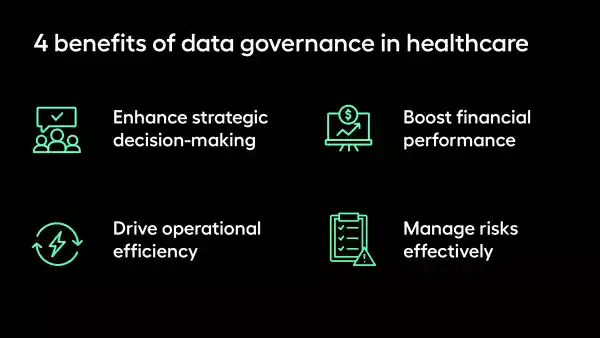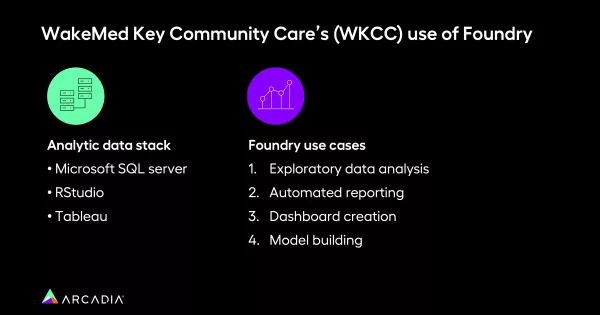The importance of data governance in healthcare
From patient records to treatment histories to billing information, healthcare organizations generate vast amounts of data. However, the healthcare industry doesn’t just produce data — organizations also analyze it for key insights that inform care decisions, increase operational efficiency, boost financial performance, and more.
Properly managing healthcare data is paramount to delivering high-quality care. That’s where data governance comes into play.
This article unpacks data governance in healthcare, including its impact on healthcare organizations and the tangible benefits of implementing effective governance strategies.
What is data governance?
Data governance is a framework for handling your organization’s data throughout its lifecycle to ensure it’s accurate, accessible, and secure. With the healthcare industry generating 30% of the world’s total data, effective data governance is especially important to handle vast amounts of sensitive information. This includes several key components:
- Data quality: Ensuring that the data is accurate, consistent, and reliable. High-quality data means fewer errors in patient records, more accurate billing, and better clinical outcomes.
- Data management: Handling and organizing data efficiently. This involves everything from data collection and storage to retrieval and usage. Effective data management practices help streamline operations and improve patient care.
- Data policies: Setting rules and guidelines for how users handle and access data. These policies ensure compliance with regulations like HIPAA and protect patient privacy.
Furthermore, it’s important to distinguish between data governance and data management. Think of data governance as the blueprint for a house. It outlines the design and rules. Data management is the actual construction process, putting the blueprint into action. Both are essential, but they play different roles in the overall structure.
How does data governance impact healthcare organizations?
Data governance might sound like a technical term best left to IT professionals, but it's a crucial concept for healthcare leaders to grasp. Every step of the data lifecycle, from collection to storage, must be carefully governed to support decision-making about patient care. Otherwise, you risk using inaccurate or incomplete data, leading to poor decisions and inefficiencies.
The consequences of poor data governance in healthcare
Imagine making a critical healthcare decision based on outdated or incorrect data. The consequences can be dire, affecting patient outcomes and operational efficiency. Healthcare organizations that neglect data governance face significant risks, including:
- Regulatory non-compliance: Failing to follow regulations can result in hefty fines and legal actions
- Data breaches: Poor data governance makes it easier for healthcare organizations to compromise sensitive patient data
- Operational inefficiencies: Inconsistent data leads to inefficiencies, higher costs, and wasted resources
- Loss of trust: Patients and stakeholders lose trust in the organization if data is unreliable or mishandled
Also, without good governance, data silos can form, causing fragmented information that is hard to integrate and analyze.
To dive deeper into the significance of data governance, check out our CIO report for detailed insights.
4 benefits of data governance in healthcare

1. Enhance strategic decision-making
High-quality data allows healthcare leaders to make informed decisions. Reliable data allows you to identify trends, forecast future needs, and allocate resources effectively. This strategic advantage can set your organization apart in a competitive landscape. For example, accurate data on patient demographics and health outcomes can help tailor healthcare services to better meet community needs.
2. Drive operational efficiency
Data governance streamlines processes and eliminates redundancies. When data is well-managed and easily accessible, workflows become smoother, and there are fewer administrative burdens. This means healthcare organizations can spend more time and money on patient care and other key tasks. For example, good data management can cut the time staff spend on data entry and retrieval, letting them focus more on patient care.
3. Boost financial performance
Accurate and well-governed data is crucial for financial planning and management. It helps ensure precise billing, manage costs, and identify financial opportunities. In a sector where every dollar counts, robust data governance can enhance financial health. Clean data helps organizations prevent billing mistakes and improve revenue management.
4. Manage risks effectively
Healthcare organizations face many risks, from data breaches to regulatory compliance issues. A strong data governance framework ensures data security and regulatory compliance. This proactive approach protects your organization and builds trust with patients and stakeholders. For example, strict data governance policies can block unauthorized access to sensitive patient information.
How to implement data governance in healthcare
Establish a framework
The first step in implementing data governance is establishing a solid framework. This involves setting up policies, standards, and practices for managing data. Define roles and responsibilities to ensure everyone knows their part in maintaining data integrity.
A comprehensive framework should include:
- Data stewardship: Assign individuals or teams to oversee data quality and compliance.
- Data governance council: Form a council to develop and enforce data governance policies.
- Policies and procedures: Create detailed data access, sharing, and protection policies.
To see this process in action, check out our data management webinar, where we discuss specific roles and responsibilities for establishing a governance framework.
Implement data management tools and technology
Advanced tools and technologies are essential to untangle healthcare data's complex web. With the evolution of healthcare technology, such as machine learning and large language models (LLM), the right platform is key to establishing and maintaining a strong data governance framework.
Arcadia's Foundry syncs quality, risk, financial, clinical, and contract data into one cohesive system. Organizations can unify their view of operations by combining data from many sources.
Jon O'Neil, Director of Analytics and IS at WakeMed Key Community Care (WKCC), shared insights into how his organization has used Foundry. Their team leveraged Foundry, along with Microsoft SQL Server, RStudio, and Tableau, to create a powerful analytics stack that connects their data and streamlines their reporting process.

Make your data more accessible
Data should be more than well-organized. It needs to be actionable. Arcadia's Vista dashboards turn data insights into practical actions. These dashboards provide real-time analytics and visualizations, making it easier for healthcare leaders to understand and act on their data. The WKCC case study highlights how making data accessible can lead to better decision-making and improved outcomes. With Vista, organizations can foster a more data-driven culture by providing staff with easy access to key metrics and trends.
Foster a culture of data-driven decision-making
While collecting and analyzing data is crucial, using it effectively is often a challenge. Many healthcare leaders recognize the importance of data but struggle to use it to its full potential. Our 2024 HIMSS Survey report reveals telling statistics about these challenges. For example, despite the availability of data, 68% of organizations have no immediate strategy to adopt innovations in analytics and artificial intelligence.
To overcome this, it is essential to:
- Promote data literacy: Educate staff on the importance of data and how to use it effectively.
- Encourage collaboration: Foster collaboration between departments to ensure organizations can share and use data effectively.
- Provide tools and training: Equip staff with the necessary tools and training to make the most of available data.
Turn data into action with healthcare data governance
Prioritizing data governance in healthcare isn't a strategic move. It's a necessity. Effective data governance enables healthcare organizations to provide better patient care, optimize operations, and achieve financial sustainability.
So, what does this mean for healthcare leaders? It's time to act. Prioritize data governance in your organization to unlock its full potential. Stay tuned for our upcoming CIO report, which will provide more detailed insights and practical tips for implementing effective data governance practices. By using these practices, healthcare leaders can navigate the complexities of modern healthcare and lead their organizations to success.
